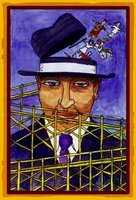Telethons and Pity (Repost)
This is a reposting of last Labor Day Weekend's post on pity. the post is just as applicable this year, as is the blogswarm.
Today is Labor Day, and, to many people, that means it’s time for Jerry Lewis and the MDA Telethon. I had never watched the telethon, and this year I checked it out for the first time. I have to say, I didn’t watch much of it, and it was enough. I am not going to comment on the mission of the Muscular Dystrophy Association (MDA); I am not familiar it. However, I would like to comment on the destructiveness of pity.
1. Pity fosters negativity. The negative aspects of the condition are emphasized and magnified, rather then the positive aspects and enormous potential of the individual's life. Instead of focusing on what a person can do by embracing all their strengths and gifts, pity limits a person.
2. Pity promotes the view of charity rather than the view of inclusion. Charity for pity divides people into 2 groups, the “haves” and the “have nots”. The premise is that the person who “has” will help the person who “does not have,” because the “haves” feel sorry for the “have nots”, rather than because it is the morally appropriate action to do. Unlike pity, inclusion encourages respectful dialogue to discuss ways to adapt to the obstacles of society.
3. Charity often seems focused on making those that contribute to the charity feel warm-and-fuzzy-good about themselves. That is the wrong focus. An action should be taken because it is the right thing to do, because it is fair and just.
4. Although often without consciously recognizing it, the person who is pitied usually has to conform in some way to the giver’s expectations and stereotypes to receive the charity. For example, in extracurricular activities in school, it seems to me that children with disabilities often have to participate in the sport or activity that has the most willing coach or advisor, rather than in the activity that the child likes the best or has a natural affinity for.
5. Pity lowers an individual’s self-esteem. It’s hard to feel good about yourself, when you are seen as a drain and burden on others.
6. Pity towards people with disabilities gives society the false impression that disability and happiness cannot coexist. That isn’t necessarily true, and that simply serves to cause more pity.
7. Another problem with charity for pity is that it can give the impression that once the charitable act has been done, societal responsibilities are finished. A corporation that publicly writes a check to MDA is still obligated to provide an inclusive work environment with fair opportunities even though they likely won’t receive public recognition for those actions.
Check out Protest Pity, The Blog Against the Telethon, for an excellent collection of thought-provoking posts about the telethon from the point of view of people with disabilities.










7 comments:
Hi, David. I love this post... Can I translate it and post it in my blog? With your credits, of course.
Sí, claro. Gracias.
That was a great post! I couldn't agree more!
David, I completely agree. Pity, very like pride, distracts one from the human condition. It puts up a barrier between individuals that impairs their ability to relate. And while charity can raise money and awareness, it does little to connect people together in celebration of their similarities, goals, and passions. Frankly, your point #7 is so completely true for many people; they feel they've met their obligation and "oh, shouldn't everyone be so proud of me because I gave money..." because they are so afraid of "getting in the trenches" and really engaging with individuals who may be different than they are.
Remember, howver, that like the pity aspect, "fear" is a more indominatable problem that creates a huge wall of separatism. This is the greater burden to tackle. Many people are afraid of the burden that they perceive "inclusion" will cause them, rather than the benefit and joy of honoring individuals for all their positive attributes. The reaching out to individuals who are different than they are causes them pain because of this fear. Then they find a way to mitigate the pain without having to get too involved...
Whether it is pity or fear, or something not yet identified herein, it remains a complete shame that anyone is disregarded for their potential or viewed as incomplete by some social "standard." We need to live for our futre and allow any and all to be the best they can be and to contribute to their lives and others without shame, without the burden of pity, without fear...only with joy and passion to live life completely, without judgment, without restriction.
Laura R.
My thoughts exactly. Your blog is an enormous blessing
Katia
Excellent information to many people like that read articles to learn about these issues of great interest.
Another problem with pity: it can lead to extreme, harmful actions being seen as justified 'for our own good'. A good example would be 'mercy killing' - mercy killing would not exist without pity.
Post a Comment